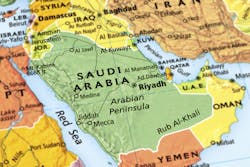Huge demand predicted for water and wastewater treatment chemicals in GCC countries
Water scarcity is a major issue in the Middle East, with many countries facing deteriorating supplies over the coming decades.
Last month, MEED Projects predicted a 40 percent increase in desalination capacity in the Gulf Cooperation Council (GCC) countries by 2020. Now a new report looks at the region’s market for water and wastewater treatment chemicals, forecasting a compound annual growth rate (CAGR) of 17.68 percent through 2020.
According to Research and Markets, the water and wastewater treatment chemicals market in the GCC region is driven by depleting water reserves and harsh climatic conditions.
Water and wastewater treatment chemicals are used to remove suspended solids, hazardous components and microorganisms from water. These chemicals are consumed in the treatment of industrial process water and sewage and for production of drinking water, including as part of the desalination process.
The GCC member states — Bahrain, Kuwait, Oman, Qatar, Saudi Arabia and the United Arab Emirates — are seeing increased demand for water, with rising populations and growth in the production of petrochemicals and downstream chemicals, along with construction chemicals, fertilizers and mining. These factors are increasing demand for water treatment chemicals, the report said.
Nalco Ecolab, which manufactures specialty water treatment chemicals, dominates the municipal and industrial water and wastewater treatment chemicals market in the GCC region. Over the forecast period, increasing demand for specialty chemicals is expected to further increase the company’s market share.
